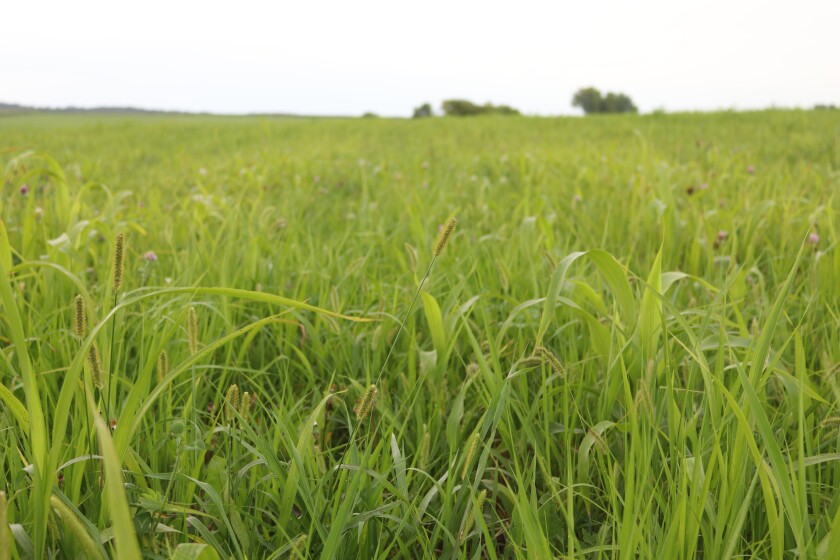REDWOOD FALLS, Minn. - A pair of monarch butterflies fluttered by Grant Breitkreutz as he stood in a field of cover crops.
"The wildlife we got back here on the farm is unbelievable," he said.
ADVERTISEMENT
Besides the butterflies, there are pheasants, quail and partridge, and "you can't even count" the deer, he explained in a visit to his farm this month. Many of the species hadn't been seen in decades until they reappeared in recent years. Breitkreutz attributes the increase in wildlife to the soil health practices implemented on the farm
But, even more importantly than the influx of wildlife, the changes made on Stoney Creek Farm have reduced input costs while maintaining or exceeding prior crop and cattle performance.
"This is keeping us in business," Breitkreutz said.
Breitkreutz and his wife, Dawn, are proponents of what they call "regenerative agriculture." To them, sustainability isn't enough. Why would one want to sustain a degraded resource? Instead, the Breitkreutzes want to "regenerate" their farm - fix it and continue to improve it for the future.
To that end, Stoney Creek Farm is 100 percent no-till on every crop and grows cover crops during or after every crop to keep living roots in the soil at all times. Cattle are cell-grazed across every acre to ensure they "get a hoof print across every inch," Breitkreutz said.
The Breitkreutzes' practices have garnered them awards and honors over the years. Most recently, Soil Health Consultants LLC held a Soil Health Academy at Stoney Creek Farm from July 31 to Aug. 2. The group's four partners, Allen Williams, Gabe Brown, Ray Archuleta and David Brandt, all came to the farm northwest of Redwood Falls for the event, along with participants from seven states and one Canadian province, ranging from college students to active and retired farmers and university professors.
The workshop addressed how improved soil health can affect such issues as profitability, the impact of droughts or floods, water quality and fertilizer inputs, and provided instruction on things like increasing organic matter, implementing integrated pest management strategies, designing cover crop mixes and integrating livestock into cropping systems.
ADVERTISEMENT
Those lessons all are on display at Stoney Creek Farm, where the Breitkreutzes are striving to quit using commercial fertilizers. They now use .2 pounds of nitrogen to produce each bushel of corn, and they have maintained an actual production history of 190 bushels per acre. It costs them $2.59 to produce each bushel of corn, which means even the relatively low local corn price of $3.21 per bushel turns a profit.
Additionally, the Breitkreutzes have seen higher percentages of protein in their corn and other feeds, which has helped when they run it through their livestock.
"They're gaining on way less feed," Breitkreutz said.
Breitkreutz stresses the importance of constant learning and finding new and better ways to do things. The cover crops on which he stood did not turn out the way he expected. But still, he has found a use for it.
"This is actually a complete failure," he said. "But we're going to make it into something. We're going to graze it."
They use a three or four crop rotation most years and have worked to determine combinations of crops and cover crops that will most adequately hold nitrogen from manure. For cover crops, they most often go with a nine-seed mix consisting of three grasses, three legumes and three brassicas.
"We're trying to make improvements all the time," he said.
ADVERTISEMENT
Grant Breitkreutz credits his wife with pushing him to make changes by getting him to provide the "why" for what he was doing. Just because something has always been done one way doesn't mean it's right, they explain. Dawn Breitkreutz continues to challenge her husband by asking "why" something has to be done, which gets him to stop and consider his reasons.
"That keeps me thinking all the time," Breitkreutz said.
The changes at Stoney Creek Farm haven't just improved the soil health and the financial viability of the farm. It's recharged the Breitkreutzes' enjoyment of their way of life. They advise other farmers to consider making changes to their farms and to think through what is truly best for them, rather than what's best for their input providers.
"It's gotten to be fun again," Breitkreutz said.












